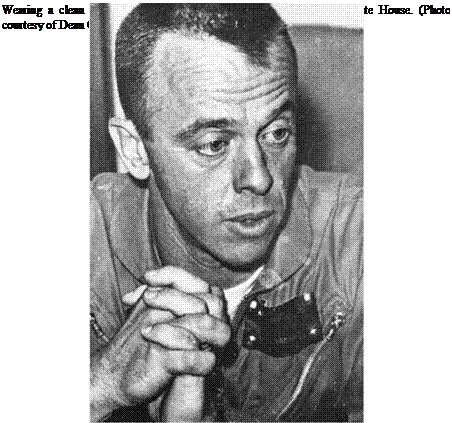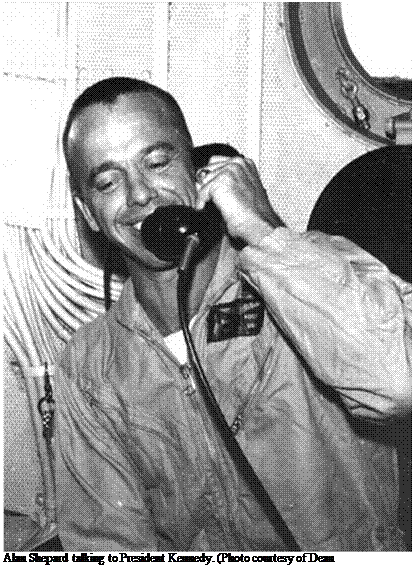A PHONE CALL FROM THE PRESIDENT
Within an hour of arriving on board the carrier, Shepard received a radiotelephone call from President Kennedy in the White House, who wanted to extend his personal congratulations:

 |
Hello, Commander.
Yes, sir.
I want to congratulate you very much.
Thank you very much, Mr. President.
We watched you on TV of course [at launch] and we are awfully pleased and proud of what you did.
Well, thank-you, sir. As you know by now, everything worked just about perfectly and it was a very rewarding experience for me and the people who made it possible.
We are looking forward to seeing you up here, Commander.
 Thank-you very much. I am looking forward to it, I assure you.
Thank-you very much. I am looking forward to it, I assure you.
The members of the National Security Council are meeting on another matter this morning and they all want me to give you their congratulations. Thank-you very much, sir, and I’m looking forward to meeting you in the near future.
 |
Thank-you, Commander, and good luck.
At a press conference earlier that day, about 20 minutes after the safe recovery of Alan Shepard, the president issued a statement:
“All America rejoices in this successful flight of astronaut Shepard. This is an historic milestone in our own exploration into space. But America still needs to work with the utmost speed and vigor in the further development of our space program. Today’s flight should provide incentive to everyone in our nation concerned with this program to redouble their efforts in this vital field. Important scientific material has been obtained during this flight and this will be made available to the world’s scientific community.
“We extend special congratulations to astronaut Shepard and best wishes to his family who lived through this most difficult time with him. Our thanks also go to the other astronauts who worked so hard as a team in this project.” [46]
The president said at his press conference that a substantially larger effort would be made in the space program, and that Congress would be asked for an additional appropriation. The request at that time was for 1.23 billion dollars, but he had earlier been advised that it would cost between 20 and 40 billion dollars to put a man on the Moon.
Whilst it should have been a joyous day for the president, with the first American astronaut safely back from space, he seemed to be anything but joyous at his press conference. He assured his audience that clearly he was happy about what had taken place, but he cited the tremendous courage and the accomplishment of Yuri Gagarin, and said that the United States was still a long way behind. Nevertheless, Shepard’s flight was just the tonic that America – and its leader – needed in order to overcome earlier disappointments and the frustrations that had been mounting since the Soviet orbiting of Gagarin and the Cuban Bay of Pigs fiasco the previous month, which was still causing immense grief and humiliation for the young, newly installed president.
Alexander Wiley of the Senate Aeronautical and Space Science Committee, was openly ecstatic, declaring, “I’m on a sort of emotional drunk.” Senator Karl Mundt, added that Alan Shepard ought to be awarded the Congressional Medal of Honor, saying that there were not enough words of praise for the bravery of the astronaut [47]. This, however, would have required a special act of Congress, so it was later decided to award him instead with NASA’s Distinguished Service Medal.[3]










